Empathetic Understanding of CKD: Qualitative Research Report NURS2101
VerifiedAdded on 2022/12/30
|11
|3121
|39
Report
AI Summary
This qualitative research report examines the lived experiences of individuals with chronic kidney disease (CKD), drawing upon three case studies to explore the challenges faced by patients and their caregivers. The report begins with an introduction to CKD, defining the disease and its impact on patients' physical and mental well-being. It then outlines the search strategy used to identify relevant qualitative studies, focusing on dietary changes, the burden of treatment, and motivations and barriers to exercise. The case studies delve into the experiences of patients with diabetes and CKD, the challenges of self-care and self-management, and the motivations and barriers to exercise. The report highlights key common findings, such as confusion among healthcare providers and a lack of resources, as well as variations in experiences based on socioeconomic status. Finally, it discusses precautions and steps to be taken to improve caregiver support, emphasizing the need for better training, cultural sensitivity, and psychosocial care. The report concludes by underscoring the importance of empathetic understanding in providing effective patient-centered care.
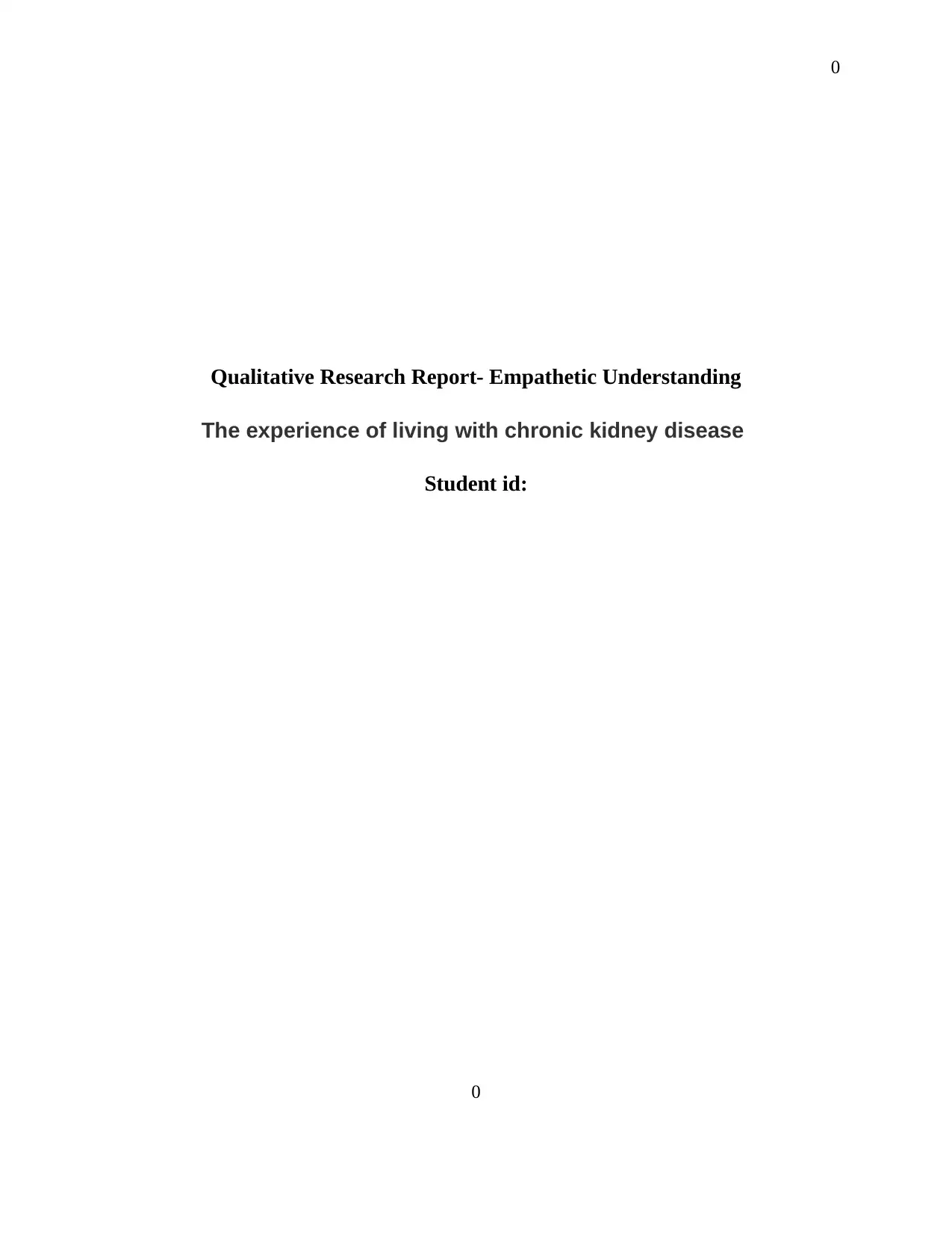
0
Qualitative Research Report- Empathetic Understanding
The experience of living with chronic kidney disease
Student id:
0
Qualitative Research Report- Empathetic Understanding
The experience of living with chronic kidney disease
Student id:
0
Paraphrase This Document
Need a fresh take? Get an instant paraphrase of this document with our AI Paraphraser
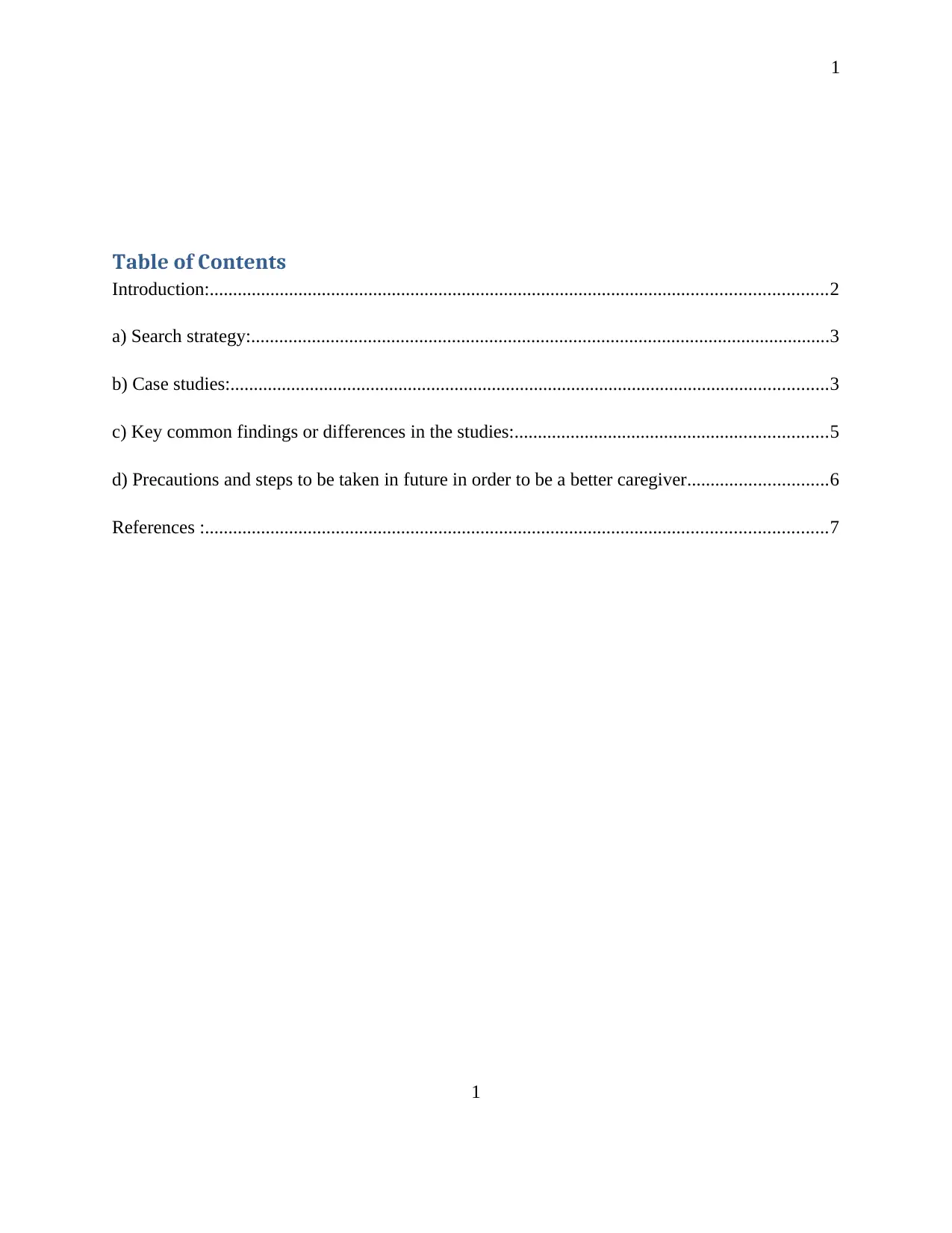
1
Table of Contents
Introduction:....................................................................................................................................2
a) Search strategy:............................................................................................................................3
b) Case studies:................................................................................................................................3
c) Key common findings or differences in the studies:...................................................................5
d) Precautions and steps to be taken in future in order to be a better caregiver..............................6
References :.....................................................................................................................................7
1
Table of Contents
Introduction:....................................................................................................................................2
a) Search strategy:............................................................................................................................3
b) Case studies:................................................................................................................................3
c) Key common findings or differences in the studies:...................................................................5
d) Precautions and steps to be taken in future in order to be a better caregiver..............................6
References :.....................................................................................................................................7
1
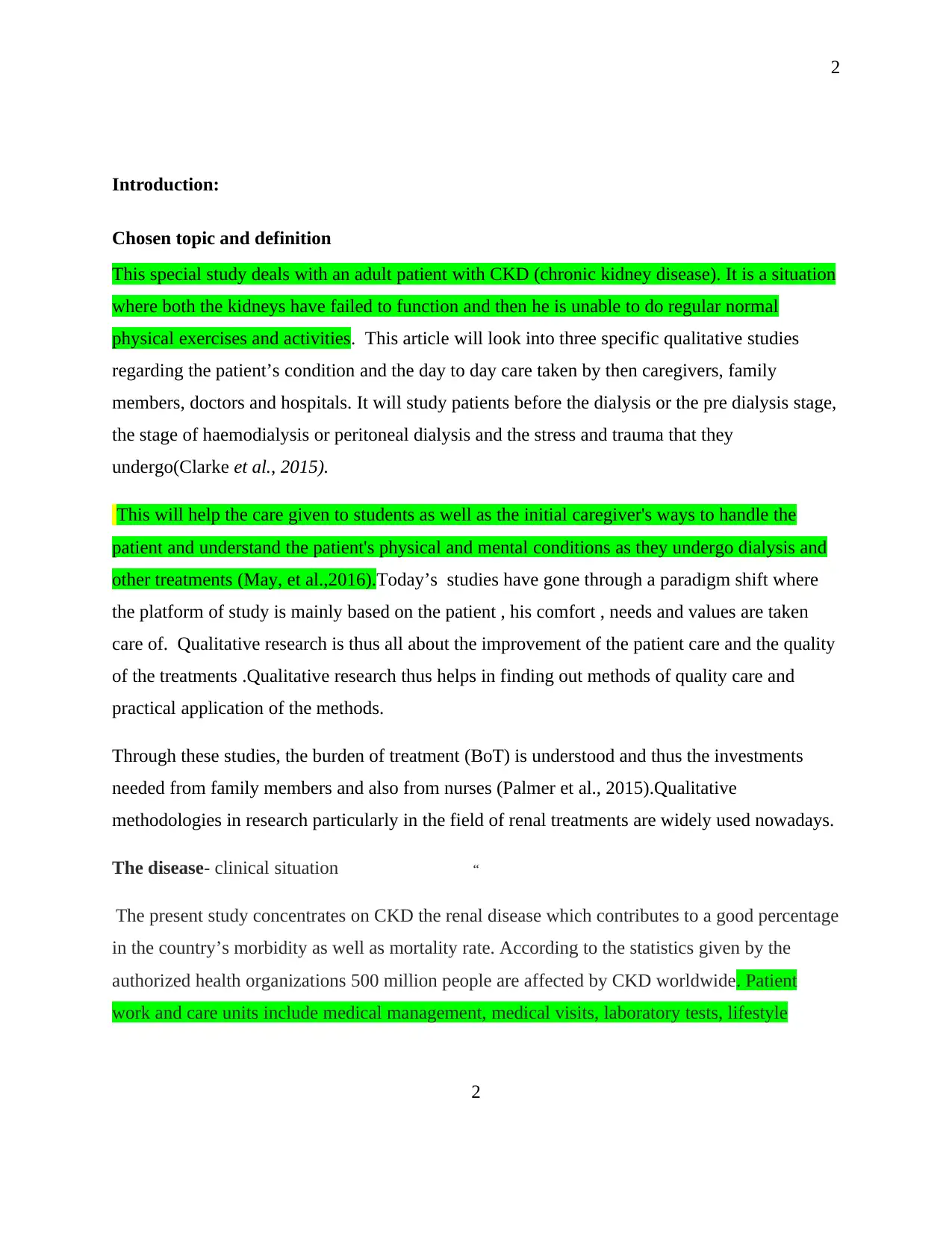
2
Introduction:
Chosen topic and definition
This special study deals with an adult patient with CKD (chronic kidney disease). It is a situation
where both the kidneys have failed to function and then he is unable to do regular normal
physical exercises and activities. This article will look into three specific qualitative studies
regarding the patient’s condition and the day to day care taken by then caregivers, family
members, doctors and hospitals. It will study patients before the dialysis or the pre dialysis stage,
the stage of haemodialysis or peritoneal dialysis and the stress and trauma that they
undergo(Clarke et al., 2015).
This will help the care given to students as well as the initial caregiver's ways to handle the
patient and understand the patient's physical and mental conditions as they undergo dialysis and
other treatments (May, et al.,2016).Today’s studies have gone through a paradigm shift where
the platform of study is mainly based on the patient , his comfort , needs and values are taken
care of. Qualitative research is thus all about the improvement of the patient care and the quality
of the treatments .Qualitative research thus helps in finding out methods of quality care and
practical application of the methods.
Through these studies, the burden of treatment (BoT) is understood and thus the investments
needed from family members and also from nurses (Palmer et al., 2015).Qualitative
methodologies in research particularly in the field of renal treatments are widely used nowadays.
The disease- clinical situation “
The present study concentrates on CKD the renal disease which contributes to a good percentage
in the country’s morbidity as well as mortality rate. According to the statistics given by the
authorized health organizations 500 million people are affected by CKD worldwide. Patient
work and care units include medical management, medical visits, laboratory tests, lifestyle
2
Introduction:
Chosen topic and definition
This special study deals with an adult patient with CKD (chronic kidney disease). It is a situation
where both the kidneys have failed to function and then he is unable to do regular normal
physical exercises and activities. This article will look into three specific qualitative studies
regarding the patient’s condition and the day to day care taken by then caregivers, family
members, doctors and hospitals. It will study patients before the dialysis or the pre dialysis stage,
the stage of haemodialysis or peritoneal dialysis and the stress and trauma that they
undergo(Clarke et al., 2015).
This will help the care given to students as well as the initial caregiver's ways to handle the
patient and understand the patient's physical and mental conditions as they undergo dialysis and
other treatments (May, et al.,2016).Today’s studies have gone through a paradigm shift where
the platform of study is mainly based on the patient , his comfort , needs and values are taken
care of. Qualitative research is thus all about the improvement of the patient care and the quality
of the treatments .Qualitative research thus helps in finding out methods of quality care and
practical application of the methods.
Through these studies, the burden of treatment (BoT) is understood and thus the investments
needed from family members and also from nurses (Palmer et al., 2015).Qualitative
methodologies in research particularly in the field of renal treatments are widely used nowadays.
The disease- clinical situation “
The present study concentrates on CKD the renal disease which contributes to a good percentage
in the country’s morbidity as well as mortality rate. According to the statistics given by the
authorized health organizations 500 million people are affected by CKD worldwide. Patient
work and care units include medical management, medical visits, laboratory tests, lifestyle
2
⊘ This is a preview!⊘
Do you want full access?
Subscribe today to unlock all pages.

Trusted by 1+ million students worldwide
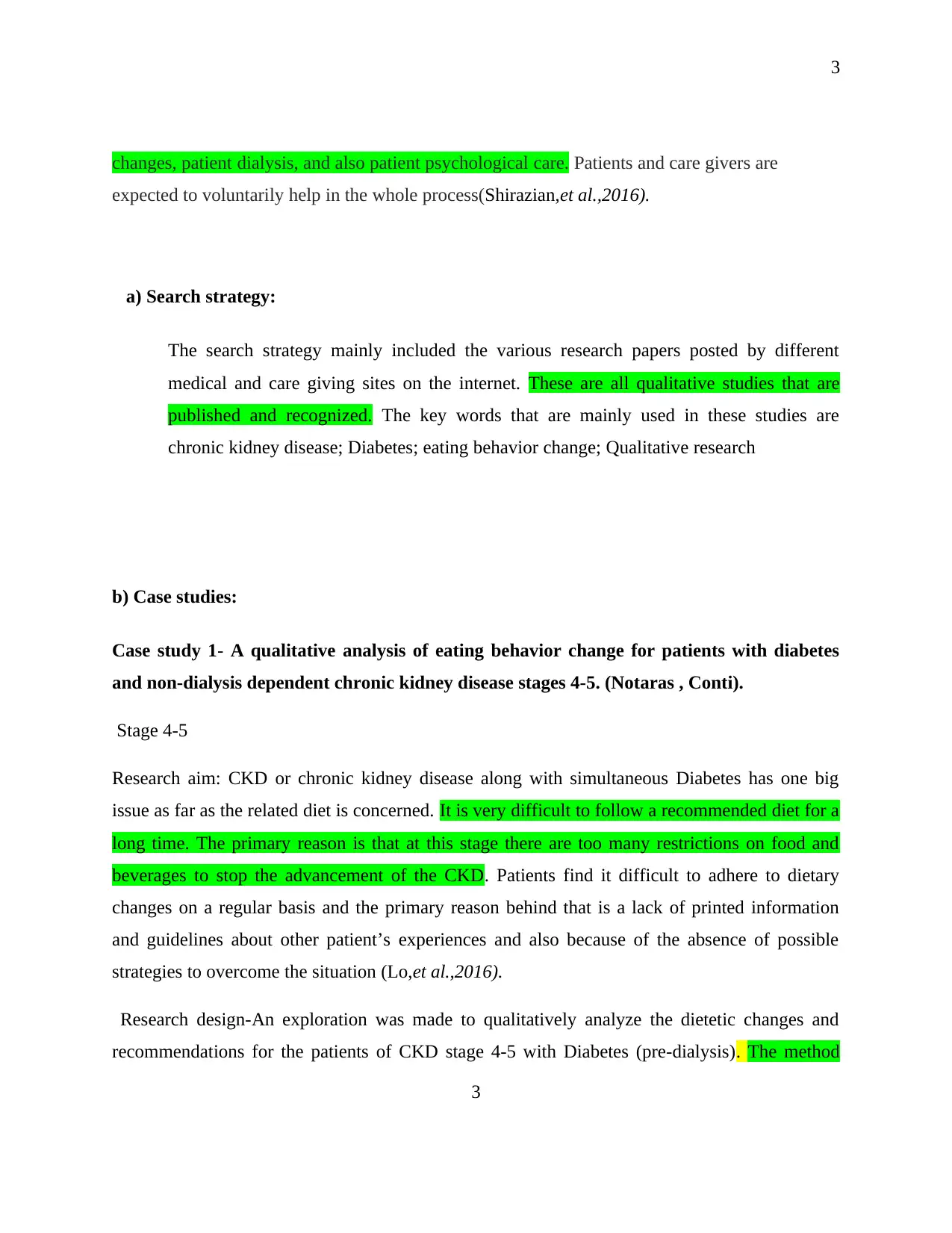
3
changes, patient dialysis, and also patient psychological care. Patients and care givers are
expected to voluntarily help in the whole process(Shirazian,et al.,2016).
a) Search strategy:
The search strategy mainly included the various research papers posted by different
medical and care giving sites on the internet. These are all qualitative studies that are
published and recognized. The key words that are mainly used in these studies are
chronic kidney disease; Diabetes; eating behavior change; Qualitative research
b) Case studies:
Case study 1- A qualitative analysis of eating behavior change for patients with diabetes
and non-dialysis dependent chronic kidney disease stages 4-5. (Notaras , Conti).
Stage 4-5
Research aim: CKD or chronic kidney disease along with simultaneous Diabetes has one big
issue as far as the related diet is concerned. It is very difficult to follow a recommended diet for a
long time. The primary reason is that at this stage there are too many restrictions on food and
beverages to stop the advancement of the CKD. Patients find it difficult to adhere to dietary
changes on a regular basis and the primary reason behind that is a lack of printed information
and guidelines about other patient’s experiences and also because of the absence of possible
strategies to overcome the situation (Lo,et al.,2016).
Research design-An exploration was made to qualitatively analyze the dietetic changes and
recommendations for the patients of CKD stage 4-5 with Diabetes (pre-dialysis). The method
3
changes, patient dialysis, and also patient psychological care. Patients and care givers are
expected to voluntarily help in the whole process(Shirazian,et al.,2016).
a) Search strategy:
The search strategy mainly included the various research papers posted by different
medical and care giving sites on the internet. These are all qualitative studies that are
published and recognized. The key words that are mainly used in these studies are
chronic kidney disease; Diabetes; eating behavior change; Qualitative research
b) Case studies:
Case study 1- A qualitative analysis of eating behavior change for patients with diabetes
and non-dialysis dependent chronic kidney disease stages 4-5. (Notaras , Conti).
Stage 4-5
Research aim: CKD or chronic kidney disease along with simultaneous Diabetes has one big
issue as far as the related diet is concerned. It is very difficult to follow a recommended diet for a
long time. The primary reason is that at this stage there are too many restrictions on food and
beverages to stop the advancement of the CKD. Patients find it difficult to adhere to dietary
changes on a regular basis and the primary reason behind that is a lack of printed information
and guidelines about other patient’s experiences and also because of the absence of possible
strategies to overcome the situation (Lo,et al.,2016).
Research design-An exploration was made to qualitatively analyze the dietetic changes and
recommendations for the patients of CKD stage 4-5 with Diabetes (pre-dialysis). The method
3
Paraphrase This Document
Need a fresh take? Get an instant paraphrase of this document with our AI Paraphraser
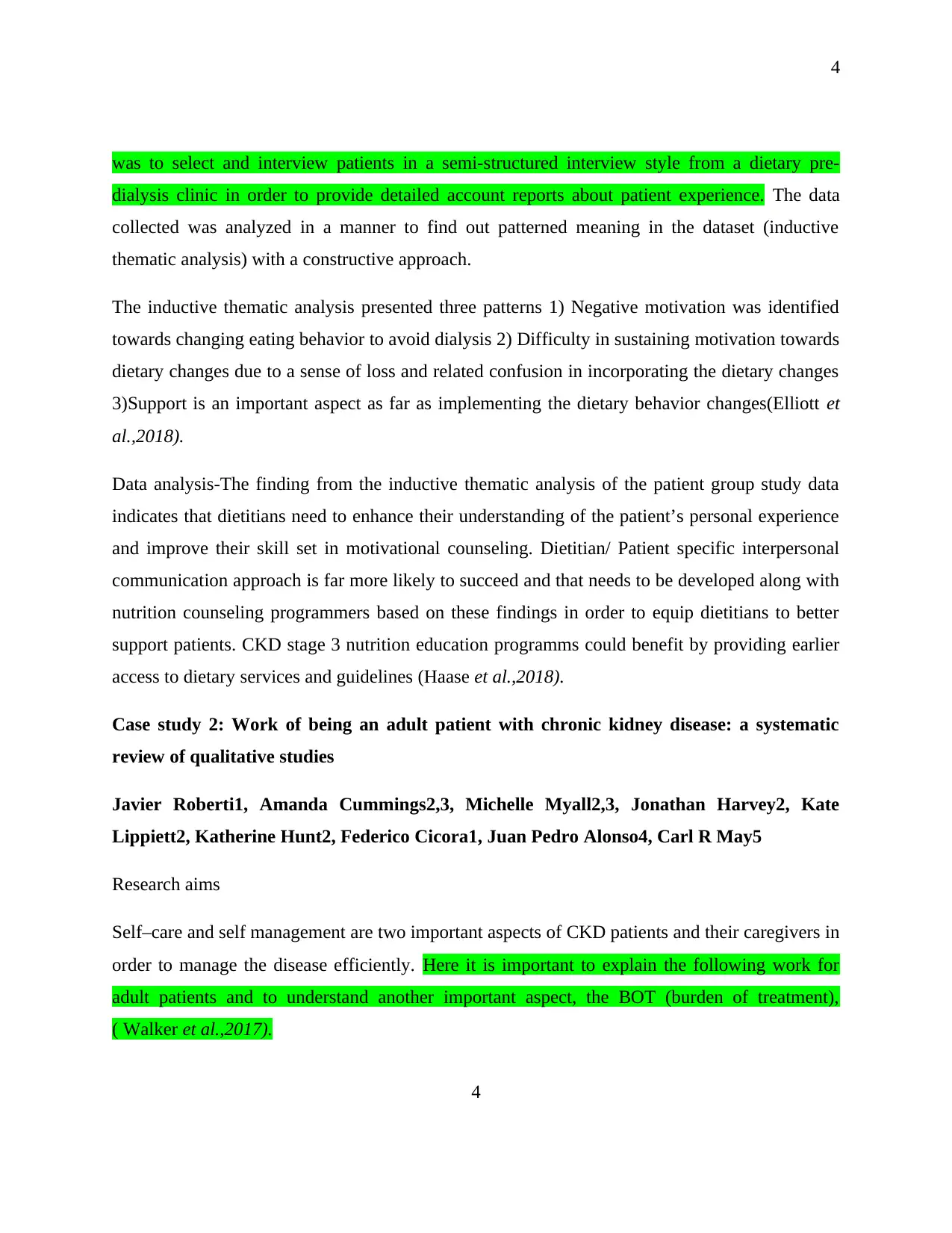
4
was to select and interview patients in a semi-structured interview style from a dietary pre-
dialysis clinic in order to provide detailed account reports about patient experience. The data
collected was analyzed in a manner to find out patterned meaning in the dataset (inductive
thematic analysis) with a constructive approach.
The inductive thematic analysis presented three patterns 1) Negative motivation was identified
towards changing eating behavior to avoid dialysis 2) Difficulty in sustaining motivation towards
dietary changes due to a sense of loss and related confusion in incorporating the dietary changes
3)Support is an important aspect as far as implementing the dietary behavior changes(Elliott et
al.,2018).
Data analysis-The finding from the inductive thematic analysis of the patient group study data
indicates that dietitians need to enhance their understanding of the patient’s personal experience
and improve their skill set in motivational counseling. Dietitian/ Patient specific interpersonal
communication approach is far more likely to succeed and that needs to be developed along with
nutrition counseling programmers based on these findings in order to equip dietitians to better
support patients. CKD stage 3 nutrition education programms could benefit by providing earlier
access to dietary services and guidelines (Haase et al.,2018).
Case study 2: Work of being an adult patient with chronic kidney disease: a systematic
review of qualitative studies
Javier Roberti1, Amanda Cummings2,3, Michelle Myall2,3, Jonathan Harvey2, Kate
Lippiett2, Katherine Hunt2, Federico Cicora1, Juan Pedro Alonso4, Carl R May5
Research aims
Self–care and self management are two important aspects of CKD patients and their caregivers in
order to manage the disease efficiently. Here it is important to explain the following work for
adult patients and to understand another important aspect, the BOT (burden of treatment),
( Walker et al.,2017).
4
was to select and interview patients in a semi-structured interview style from a dietary pre-
dialysis clinic in order to provide detailed account reports about patient experience. The data
collected was analyzed in a manner to find out patterned meaning in the dataset (inductive
thematic analysis) with a constructive approach.
The inductive thematic analysis presented three patterns 1) Negative motivation was identified
towards changing eating behavior to avoid dialysis 2) Difficulty in sustaining motivation towards
dietary changes due to a sense of loss and related confusion in incorporating the dietary changes
3)Support is an important aspect as far as implementing the dietary behavior changes(Elliott et
al.,2018).
Data analysis-The finding from the inductive thematic analysis of the patient group study data
indicates that dietitians need to enhance their understanding of the patient’s personal experience
and improve their skill set in motivational counseling. Dietitian/ Patient specific interpersonal
communication approach is far more likely to succeed and that needs to be developed along with
nutrition counseling programmers based on these findings in order to equip dietitians to better
support patients. CKD stage 3 nutrition education programms could benefit by providing earlier
access to dietary services and guidelines (Haase et al.,2018).
Case study 2: Work of being an adult patient with chronic kidney disease: a systematic
review of qualitative studies
Javier Roberti1, Amanda Cummings2,3, Michelle Myall2,3, Jonathan Harvey2, Kate
Lippiett2, Katherine Hunt2, Federico Cicora1, Juan Pedro Alonso4, Carl R May5
Research aims
Self–care and self management are two important aspects of CKD patients and their caregivers in
order to manage the disease efficiently. Here it is important to explain the following work for
adult patients and to understand another important aspect, the BOT (burden of treatment),
( Walker et al.,2017).
4
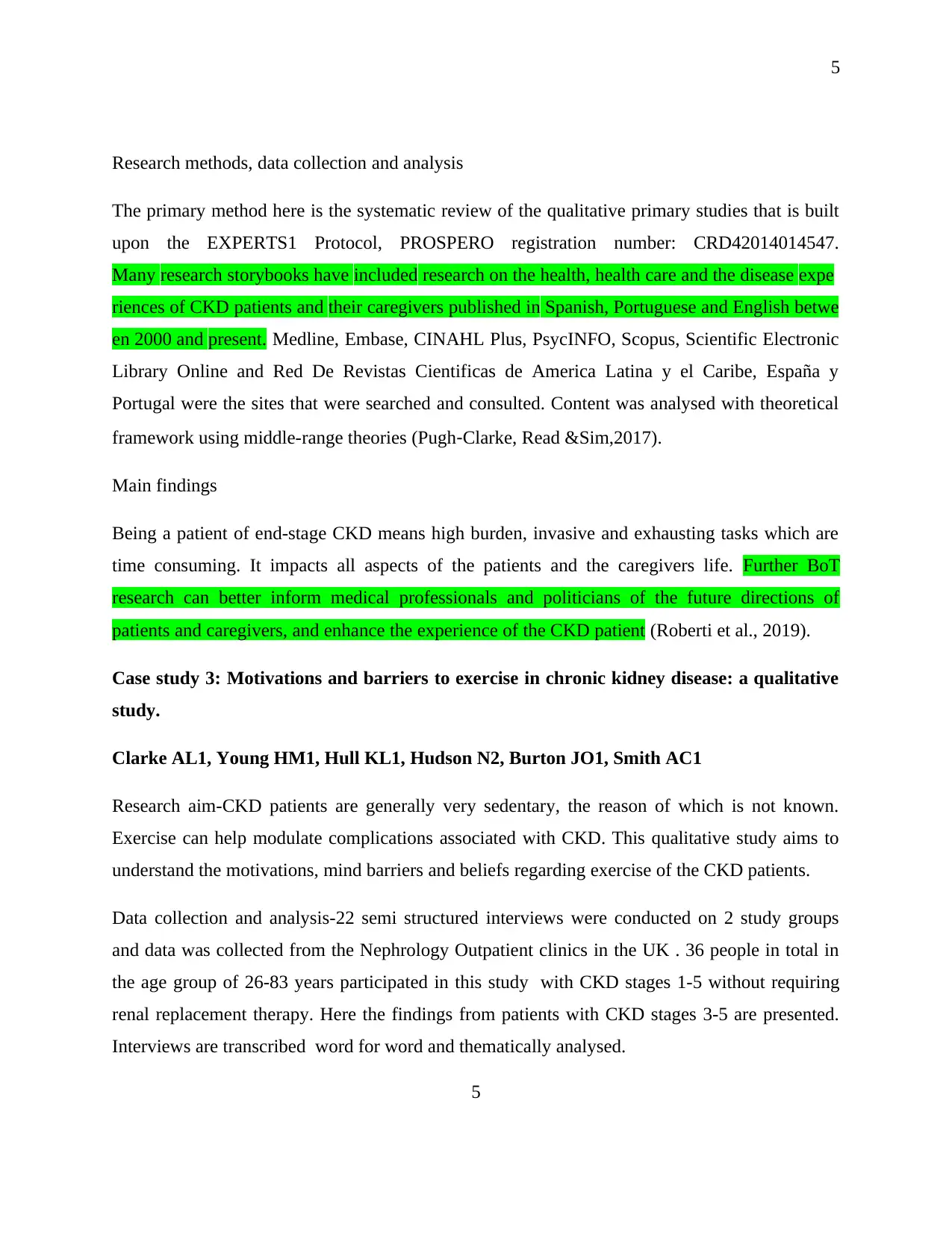
5
Research methods, data collection and analysis
The primary method here is the systematic review of the qualitative primary studies that is built
upon the EXPERTS1 Protocol, PROSPERO registration number: CRD42014014547.
Many research storybooks have included research on the health, health care and the disease expe
riences of CKD patients and their caregivers published in Spanish, Portuguese and English betwe
en 2000 and present. Medline, Embase, CINAHL Plus, PsycINFO, Scopus, Scientific Electronic
Library Online and Red De Revistas Cientificas de America Latina y el Caribe, España y
Portugal were the sites that were searched and consulted. Content was analysed with theoretical
framework using middle-range theories (Pugh‐Clarke, Read &Sim,2017).
Main findings
Being a patient of end-stage CKD means high burden, invasive and exhausting tasks which are
time consuming. It impacts all aspects of the patients and the caregivers life. Further BoT
research can better inform medical professionals and politicians of the future directions of
patients and caregivers, and enhance the experience of the CKD patient (Roberti et al., 2019).
Case study 3: Motivations and barriers to exercise in chronic kidney disease: a qualitative
study.
Clarke AL1, Young HM1, Hull KL1, Hudson N2, Burton JO1, Smith AC1
Research aim-CKD patients are generally very sedentary, the reason of which is not known.
Exercise can help modulate complications associated with CKD. This qualitative study aims to
understand the motivations, mind barriers and beliefs regarding exercise of the CKD patients.
Data collection and analysis-22 semi structured interviews were conducted on 2 study groups
and data was collected from the Nephrology Outpatient clinics in the UK . 36 people in total in
the age group of 26-83 years participated in this study with CKD stages 1-5 without requiring
renal replacement therapy. Here the findings from patients with CKD stages 3-5 are presented.
Interviews are transcribed word for word and thematically analysed.
5
Research methods, data collection and analysis
The primary method here is the systematic review of the qualitative primary studies that is built
upon the EXPERTS1 Protocol, PROSPERO registration number: CRD42014014547.
Many research storybooks have included research on the health, health care and the disease expe
riences of CKD patients and their caregivers published in Spanish, Portuguese and English betwe
en 2000 and present. Medline, Embase, CINAHL Plus, PsycINFO, Scopus, Scientific Electronic
Library Online and Red De Revistas Cientificas de America Latina y el Caribe, España y
Portugal were the sites that were searched and consulted. Content was analysed with theoretical
framework using middle-range theories (Pugh‐Clarke, Read &Sim,2017).
Main findings
Being a patient of end-stage CKD means high burden, invasive and exhausting tasks which are
time consuming. It impacts all aspects of the patients and the caregivers life. Further BoT
research can better inform medical professionals and politicians of the future directions of
patients and caregivers, and enhance the experience of the CKD patient (Roberti et al., 2019).
Case study 3: Motivations and barriers to exercise in chronic kidney disease: a qualitative
study.
Clarke AL1, Young HM1, Hull KL1, Hudson N2, Burton JO1, Smith AC1
Research aim-CKD patients are generally very sedentary, the reason of which is not known.
Exercise can help modulate complications associated with CKD. This qualitative study aims to
understand the motivations, mind barriers and beliefs regarding exercise of the CKD patients.
Data collection and analysis-22 semi structured interviews were conducted on 2 study groups
and data was collected from the Nephrology Outpatient clinics in the UK . 36 people in total in
the age group of 26-83 years participated in this study with CKD stages 1-5 without requiring
renal replacement therapy. Here the findings from patients with CKD stages 3-5 are presented.
Interviews are transcribed word for word and thematically analysed.
5
⊘ This is a preview!⊘
Do you want full access?
Subscribe today to unlock all pages.

Trusted by 1+ million students worldwide
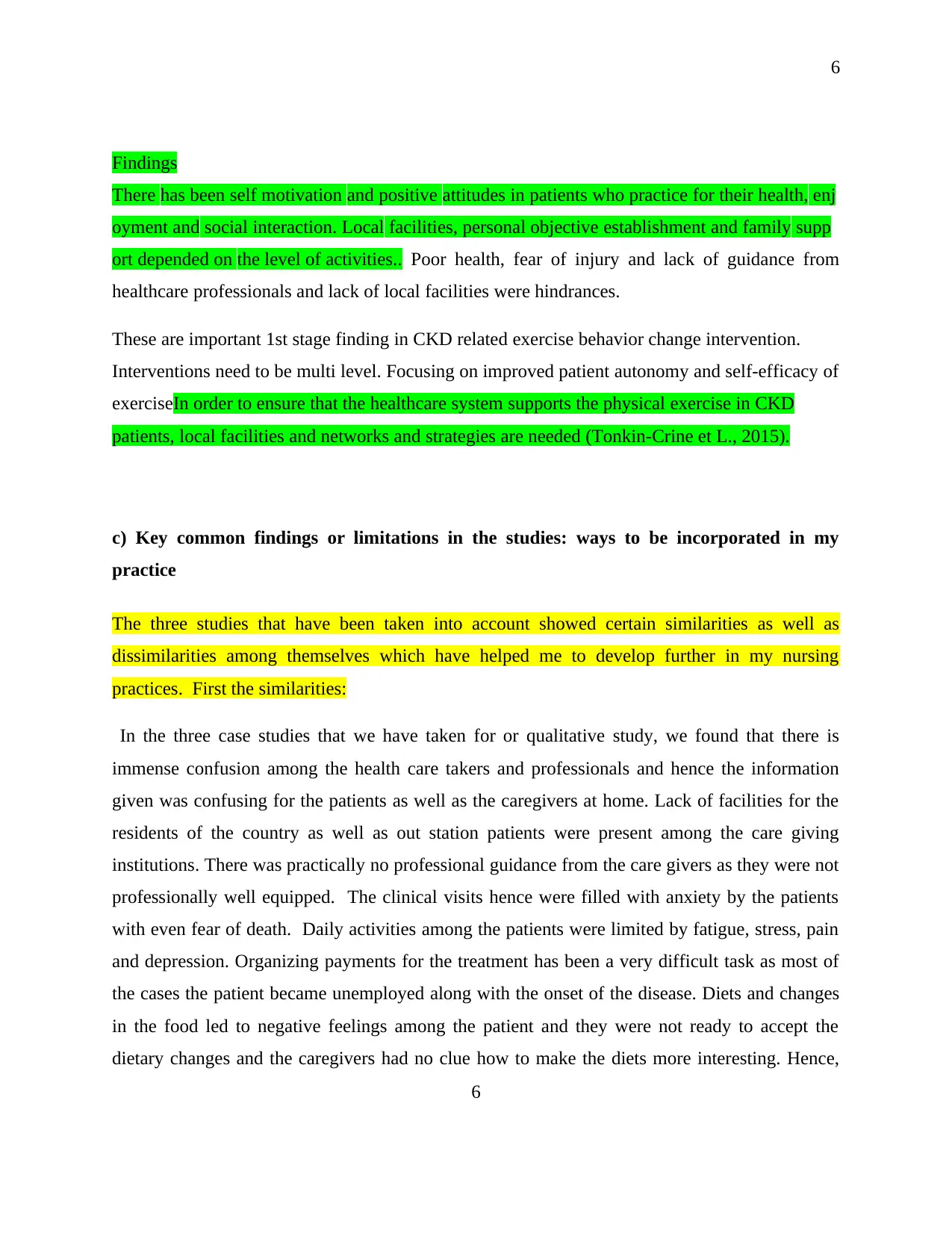
6
Findings
There has been self motivation and positive attitudes in patients who practice for their health, enj
oyment and social interaction. Local facilities, personal objective establishment and family supp
ort depended on the level of activities.. Poor health, fear of injury and lack of guidance from
healthcare professionals and lack of local facilities were hindrances.
These are important 1st stage finding in CKD related exercise behavior change intervention.
Interventions need to be multi level. Focusing on improved patient autonomy and self-efficacy of
exerciseIn order to ensure that the healthcare system supports the physical exercise in CKD
patients, local facilities and networks and strategies are needed (Tonkin-Crine et L., 2015).
c) Key common findings or limitations in the studies: ways to be incorporated in my
practice
The three studies that have been taken into account showed certain similarities as well as
dissimilarities among themselves which have helped me to develop further in my nursing
practices. First the similarities:
In the three case studies that we have taken for or qualitative study, we found that there is
immense confusion among the health care takers and professionals and hence the information
given was confusing for the patients as well as the caregivers at home. Lack of facilities for the
residents of the country as well as out station patients were present among the care giving
institutions. There was practically no professional guidance from the care givers as they were not
professionally well equipped. The clinical visits hence were filled with anxiety by the patients
with even fear of death. Daily activities among the patients were limited by fatigue, stress, pain
and depression. Organizing payments for the treatment has been a very difficult task as most of
the cases the patient became unemployed along with the onset of the disease. Diets and changes
in the food led to negative feelings among the patient and they were not ready to accept the
dietary changes and the caregivers had no clue how to make the diets more interesting. Hence,
6
Findings
There has been self motivation and positive attitudes in patients who practice for their health, enj
oyment and social interaction. Local facilities, personal objective establishment and family supp
ort depended on the level of activities.. Poor health, fear of injury and lack of guidance from
healthcare professionals and lack of local facilities were hindrances.
These are important 1st stage finding in CKD related exercise behavior change intervention.
Interventions need to be multi level. Focusing on improved patient autonomy and self-efficacy of
exerciseIn order to ensure that the healthcare system supports the physical exercise in CKD
patients, local facilities and networks and strategies are needed (Tonkin-Crine et L., 2015).
c) Key common findings or limitations in the studies: ways to be incorporated in my
practice
The three studies that have been taken into account showed certain similarities as well as
dissimilarities among themselves which have helped me to develop further in my nursing
practices. First the similarities:
In the three case studies that we have taken for or qualitative study, we found that there is
immense confusion among the health care takers and professionals and hence the information
given was confusing for the patients as well as the caregivers at home. Lack of facilities for the
residents of the country as well as out station patients were present among the care giving
institutions. There was practically no professional guidance from the care givers as they were not
professionally well equipped. The clinical visits hence were filled with anxiety by the patients
with even fear of death. Daily activities among the patients were limited by fatigue, stress, pain
and depression. Organizing payments for the treatment has been a very difficult task as most of
the cases the patient became unemployed along with the onset of the disease. Diets and changes
in the food led to negative feelings among the patient and they were not ready to accept the
dietary changes and the caregivers had no clue how to make the diets more interesting. Hence,
6
Paraphrase This Document
Need a fresh take? Get an instant paraphrase of this document with our AI Paraphraser
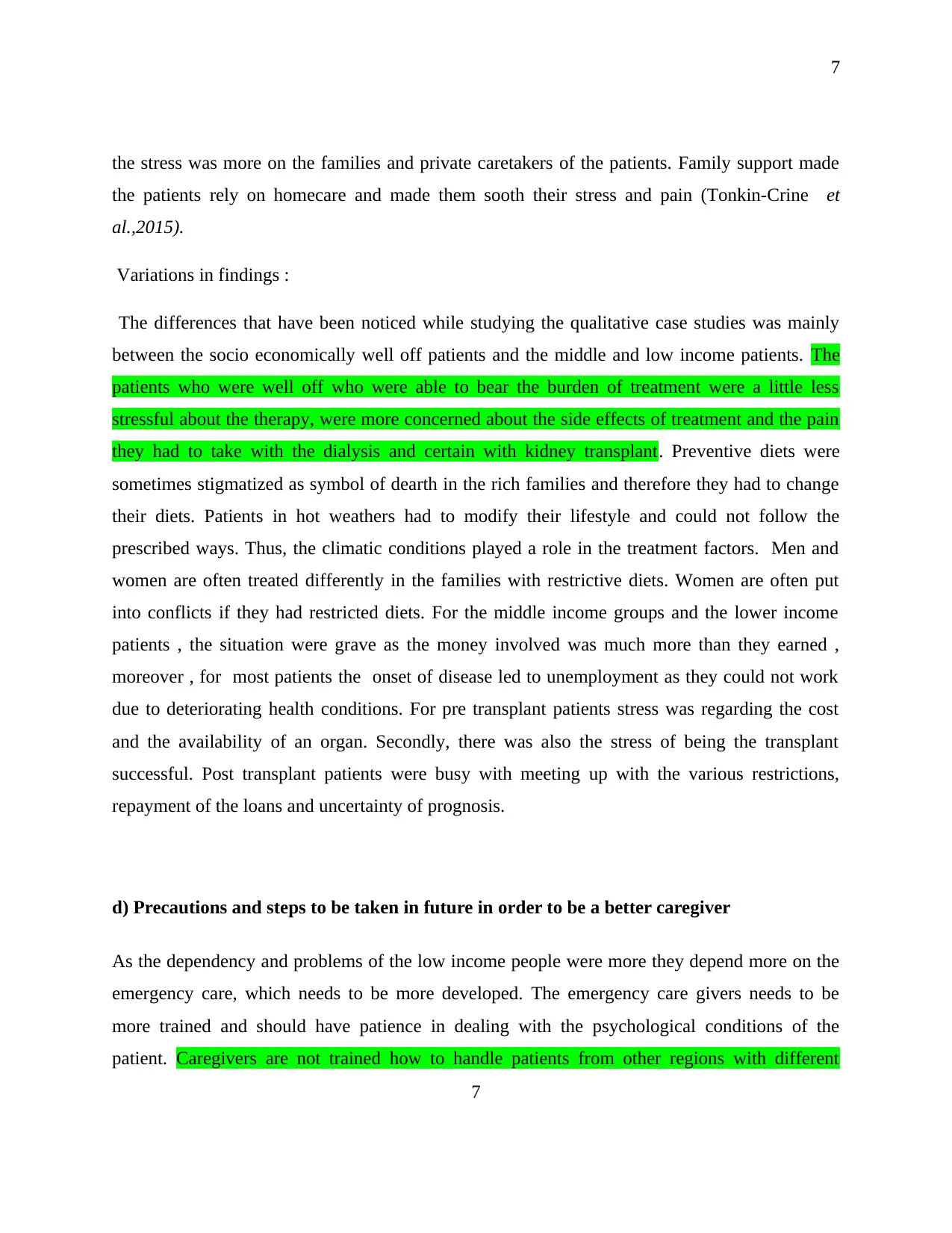
7
the stress was more on the families and private caretakers of the patients. Family support made
the patients rely on homecare and made them sooth their stress and pain (Tonkin-Crine et
al.,2015).
Variations in findings :
The differences that have been noticed while studying the qualitative case studies was mainly
between the socio economically well off patients and the middle and low income patients. The
patients who were well off who were able to bear the burden of treatment were a little less
stressful about the therapy, were more concerned about the side effects of treatment and the pain
they had to take with the dialysis and certain with kidney transplant. Preventive diets were
sometimes stigmatized as symbol of dearth in the rich families and therefore they had to change
their diets. Patients in hot weathers had to modify their lifestyle and could not follow the
prescribed ways. Thus, the climatic conditions played a role in the treatment factors. Men and
women are often treated differently in the families with restrictive diets. Women are often put
into conflicts if they had restricted diets. For the middle income groups and the lower income
patients , the situation were grave as the money involved was much more than they earned ,
moreover , for most patients the onset of disease led to unemployment as they could not work
due to deteriorating health conditions. For pre transplant patients stress was regarding the cost
and the availability of an organ. Secondly, there was also the stress of being the transplant
successful. Post transplant patients were busy with meeting up with the various restrictions,
repayment of the loans and uncertainty of prognosis.
d) Precautions and steps to be taken in future in order to be a better caregiver
As the dependency and problems of the low income people were more they depend more on the
emergency care, which needs to be more developed. The emergency care givers needs to be
more trained and should have patience in dealing with the psychological conditions of the
patient. Caregivers are not trained how to handle patients from other regions with different
7
the stress was more on the families and private caretakers of the patients. Family support made
the patients rely on homecare and made them sooth their stress and pain (Tonkin-Crine et
al.,2015).
Variations in findings :
The differences that have been noticed while studying the qualitative case studies was mainly
between the socio economically well off patients and the middle and low income patients. The
patients who were well off who were able to bear the burden of treatment were a little less
stressful about the therapy, were more concerned about the side effects of treatment and the pain
they had to take with the dialysis and certain with kidney transplant. Preventive diets were
sometimes stigmatized as symbol of dearth in the rich families and therefore they had to change
their diets. Patients in hot weathers had to modify their lifestyle and could not follow the
prescribed ways. Thus, the climatic conditions played a role in the treatment factors. Men and
women are often treated differently in the families with restrictive diets. Women are often put
into conflicts if they had restricted diets. For the middle income groups and the lower income
patients , the situation were grave as the money involved was much more than they earned ,
moreover , for most patients the onset of disease led to unemployment as they could not work
due to deteriorating health conditions. For pre transplant patients stress was regarding the cost
and the availability of an organ. Secondly, there was also the stress of being the transplant
successful. Post transplant patients were busy with meeting up with the various restrictions,
repayment of the loans and uncertainty of prognosis.
d) Precautions and steps to be taken in future in order to be a better caregiver
As the dependency and problems of the low income people were more they depend more on the
emergency care, which needs to be more developed. The emergency care givers needs to be
more trained and should have patience in dealing with the psychological conditions of the
patient. Caregivers are not trained how to handle patients from other regions with different
7
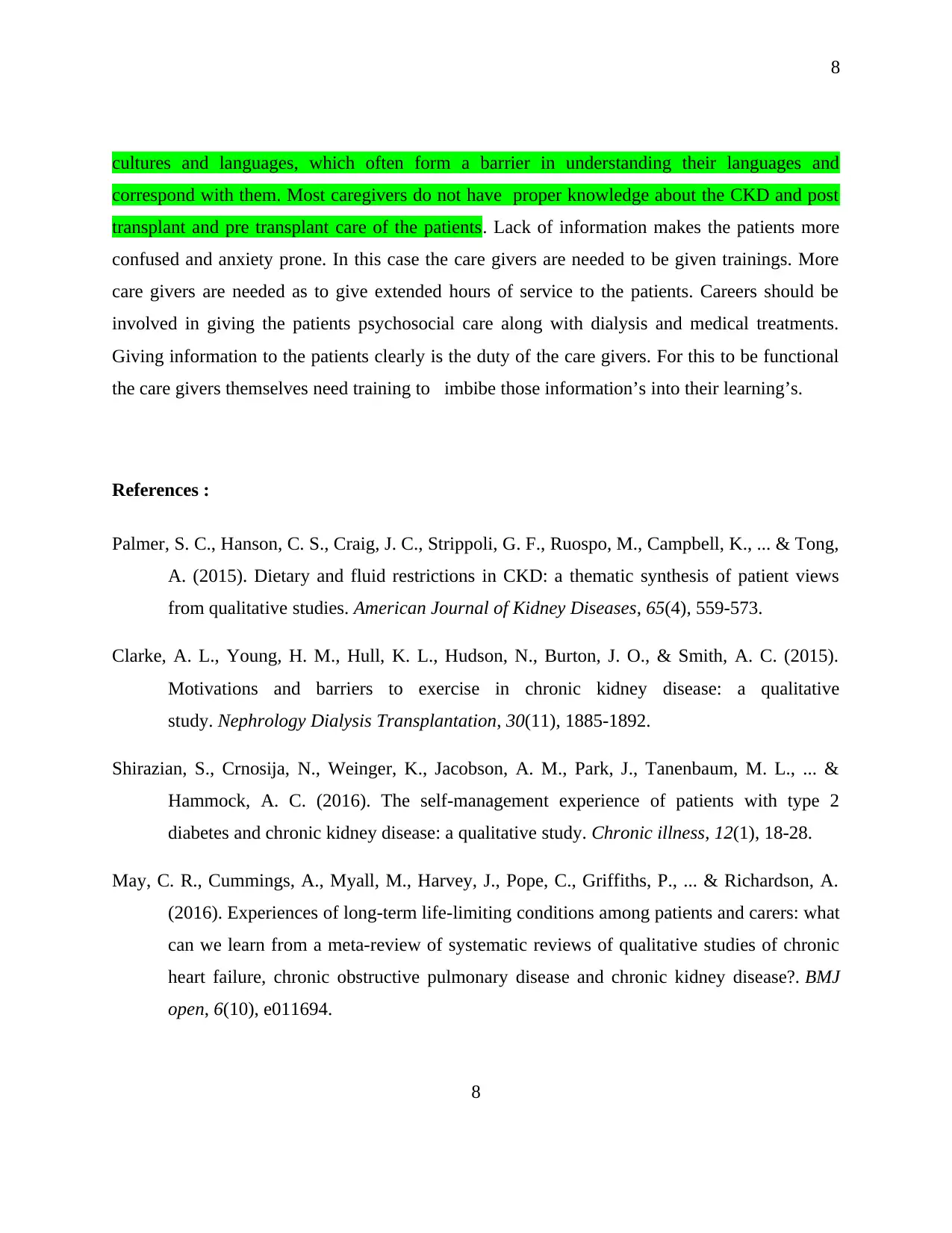
8
cultures and languages, which often form a barrier in understanding their languages and
correspond with them. Most caregivers do not have proper knowledge about the CKD and post
transplant and pre transplant care of the patients. Lack of information makes the patients more
confused and anxiety prone. In this case the care givers are needed to be given trainings. More
care givers are needed as to give extended hours of service to the patients. Careers should be
involved in giving the patients psychosocial care along with dialysis and medical treatments.
Giving information to the patients clearly is the duty of the care givers. For this to be functional
the care givers themselves need training to imbibe those information’s into their learning’s.
References :
Palmer, S. C., Hanson, C. S., Craig, J. C., Strippoli, G. F., Ruospo, M., Campbell, K., ... & Tong,
A. (2015). Dietary and fluid restrictions in CKD: a thematic synthesis of patient views
from qualitative studies. American Journal of Kidney Diseases, 65(4), 559-573.
Clarke, A. L., Young, H. M., Hull, K. L., Hudson, N., Burton, J. O., & Smith, A. C. (2015).
Motivations and barriers to exercise in chronic kidney disease: a qualitative
study. Nephrology Dialysis Transplantation, 30(11), 1885-1892.
Shirazian, S., Crnosija, N., Weinger, K., Jacobson, A. M., Park, J., Tanenbaum, M. L., ... &
Hammock, A. C. (2016). The self-management experience of patients with type 2
diabetes and chronic kidney disease: a qualitative study. Chronic illness, 12(1), 18-28.
May, C. R., Cummings, A., Myall, M., Harvey, J., Pope, C., Griffiths, P., ... & Richardson, A.
(2016). Experiences of long-term life-limiting conditions among patients and carers: what
can we learn from a meta-review of systematic reviews of qualitative studies of chronic
heart failure, chronic obstructive pulmonary disease and chronic kidney disease?. BMJ
open, 6(10), e011694.
8
cultures and languages, which often form a barrier in understanding their languages and
correspond with them. Most caregivers do not have proper knowledge about the CKD and post
transplant and pre transplant care of the patients. Lack of information makes the patients more
confused and anxiety prone. In this case the care givers are needed to be given trainings. More
care givers are needed as to give extended hours of service to the patients. Careers should be
involved in giving the patients psychosocial care along with dialysis and medical treatments.
Giving information to the patients clearly is the duty of the care givers. For this to be functional
the care givers themselves need training to imbibe those information’s into their learning’s.
References :
Palmer, S. C., Hanson, C. S., Craig, J. C., Strippoli, G. F., Ruospo, M., Campbell, K., ... & Tong,
A. (2015). Dietary and fluid restrictions in CKD: a thematic synthesis of patient views
from qualitative studies. American Journal of Kidney Diseases, 65(4), 559-573.
Clarke, A. L., Young, H. M., Hull, K. L., Hudson, N., Burton, J. O., & Smith, A. C. (2015).
Motivations and barriers to exercise in chronic kidney disease: a qualitative
study. Nephrology Dialysis Transplantation, 30(11), 1885-1892.
Shirazian, S., Crnosija, N., Weinger, K., Jacobson, A. M., Park, J., Tanenbaum, M. L., ... &
Hammock, A. C. (2016). The self-management experience of patients with type 2
diabetes and chronic kidney disease: a qualitative study. Chronic illness, 12(1), 18-28.
May, C. R., Cummings, A., Myall, M., Harvey, J., Pope, C., Griffiths, P., ... & Richardson, A.
(2016). Experiences of long-term life-limiting conditions among patients and carers: what
can we learn from a meta-review of systematic reviews of qualitative studies of chronic
heart failure, chronic obstructive pulmonary disease and chronic kidney disease?. BMJ
open, 6(10), e011694.
8
⊘ This is a preview!⊘
Do you want full access?
Subscribe today to unlock all pages.

Trusted by 1+ million students worldwide
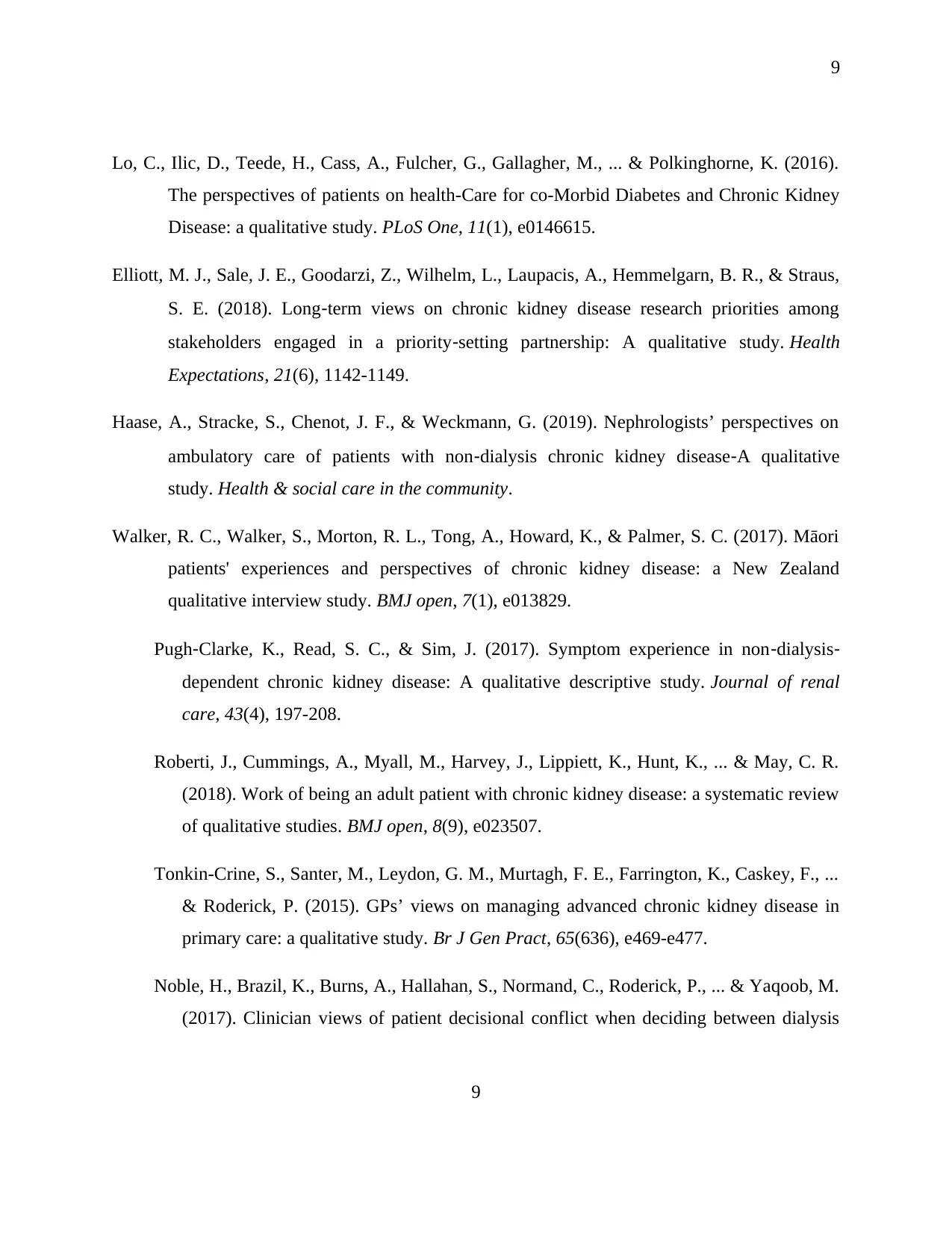
9
Lo, C., Ilic, D., Teede, H., Cass, A., Fulcher, G., Gallagher, M., ... & Polkinghorne, K. (2016).
The perspectives of patients on health-Care for co-Morbid Diabetes and Chronic Kidney
Disease: a qualitative study. PLoS One, 11(1), e0146615.
Elliott, M. J., Sale, J. E., Goodarzi, Z., Wilhelm, L., Laupacis, A., Hemmelgarn, B. R., & Straus,
S. E. (2018). Long‐term views on chronic kidney disease research priorities among
stakeholders engaged in a priority‐setting partnership: A qualitative study. Health
Expectations, 21(6), 1142-1149.
Haase, A., Stracke, S., Chenot, J. F., & Weckmann, G. (2019). Nephrologists’ perspectives on
ambulatory care of patients with non‐dialysis chronic kidney disease‐A qualitative
study. Health & social care in the community.
Walker, R. C., Walker, S., Morton, R. L., Tong, A., Howard, K., & Palmer, S. C. (2017). Māori
patients' experiences and perspectives of chronic kidney disease: a New Zealand
qualitative interview study. BMJ open, 7(1), e013829.
Pugh‐Clarke, K., Read, S. C., & Sim, J. (2017). Symptom experience in non‐dialysis‐
dependent chronic kidney disease: A qualitative descriptive study. Journal of renal
care, 43(4), 197-208.
Roberti, J., Cummings, A., Myall, M., Harvey, J., Lippiett, K., Hunt, K., ... & May, C. R.
(2018). Work of being an adult patient with chronic kidney disease: a systematic review
of qualitative studies. BMJ open, 8(9), e023507.
Tonkin-Crine, S., Santer, M., Leydon, G. M., Murtagh, F. E., Farrington, K., Caskey, F., ...
& Roderick, P. (2015). GPs’ views on managing advanced chronic kidney disease in
primary care: a qualitative study. Br J Gen Pract, 65(636), e469-e477.
Noble, H., Brazil, K., Burns, A., Hallahan, S., Normand, C., Roderick, P., ... & Yaqoob, M.
(2017). Clinician views of patient decisional conflict when deciding between dialysis
9
Lo, C., Ilic, D., Teede, H., Cass, A., Fulcher, G., Gallagher, M., ... & Polkinghorne, K. (2016).
The perspectives of patients on health-Care for co-Morbid Diabetes and Chronic Kidney
Disease: a qualitative study. PLoS One, 11(1), e0146615.
Elliott, M. J., Sale, J. E., Goodarzi, Z., Wilhelm, L., Laupacis, A., Hemmelgarn, B. R., & Straus,
S. E. (2018). Long‐term views on chronic kidney disease research priorities among
stakeholders engaged in a priority‐setting partnership: A qualitative study. Health
Expectations, 21(6), 1142-1149.
Haase, A., Stracke, S., Chenot, J. F., & Weckmann, G. (2019). Nephrologists’ perspectives on
ambulatory care of patients with non‐dialysis chronic kidney disease‐A qualitative
study. Health & social care in the community.
Walker, R. C., Walker, S., Morton, R. L., Tong, A., Howard, K., & Palmer, S. C. (2017). Māori
patients' experiences and perspectives of chronic kidney disease: a New Zealand
qualitative interview study. BMJ open, 7(1), e013829.
Pugh‐Clarke, K., Read, S. C., & Sim, J. (2017). Symptom experience in non‐dialysis‐
dependent chronic kidney disease: A qualitative descriptive study. Journal of renal
care, 43(4), 197-208.
Roberti, J., Cummings, A., Myall, M., Harvey, J., Lippiett, K., Hunt, K., ... & May, C. R.
(2018). Work of being an adult patient with chronic kidney disease: a systematic review
of qualitative studies. BMJ open, 8(9), e023507.
Tonkin-Crine, S., Santer, M., Leydon, G. M., Murtagh, F. E., Farrington, K., Caskey, F., ...
& Roderick, P. (2015). GPs’ views on managing advanced chronic kidney disease in
primary care: a qualitative study. Br J Gen Pract, 65(636), e469-e477.
Noble, H., Brazil, K., Burns, A., Hallahan, S., Normand, C., Roderick, P., ... & Yaqoob, M.
(2017). Clinician views of patient decisional conflict when deciding between dialysis
9
Paraphrase This Document
Need a fresh take? Get an instant paraphrase of this document with our AI Paraphraser
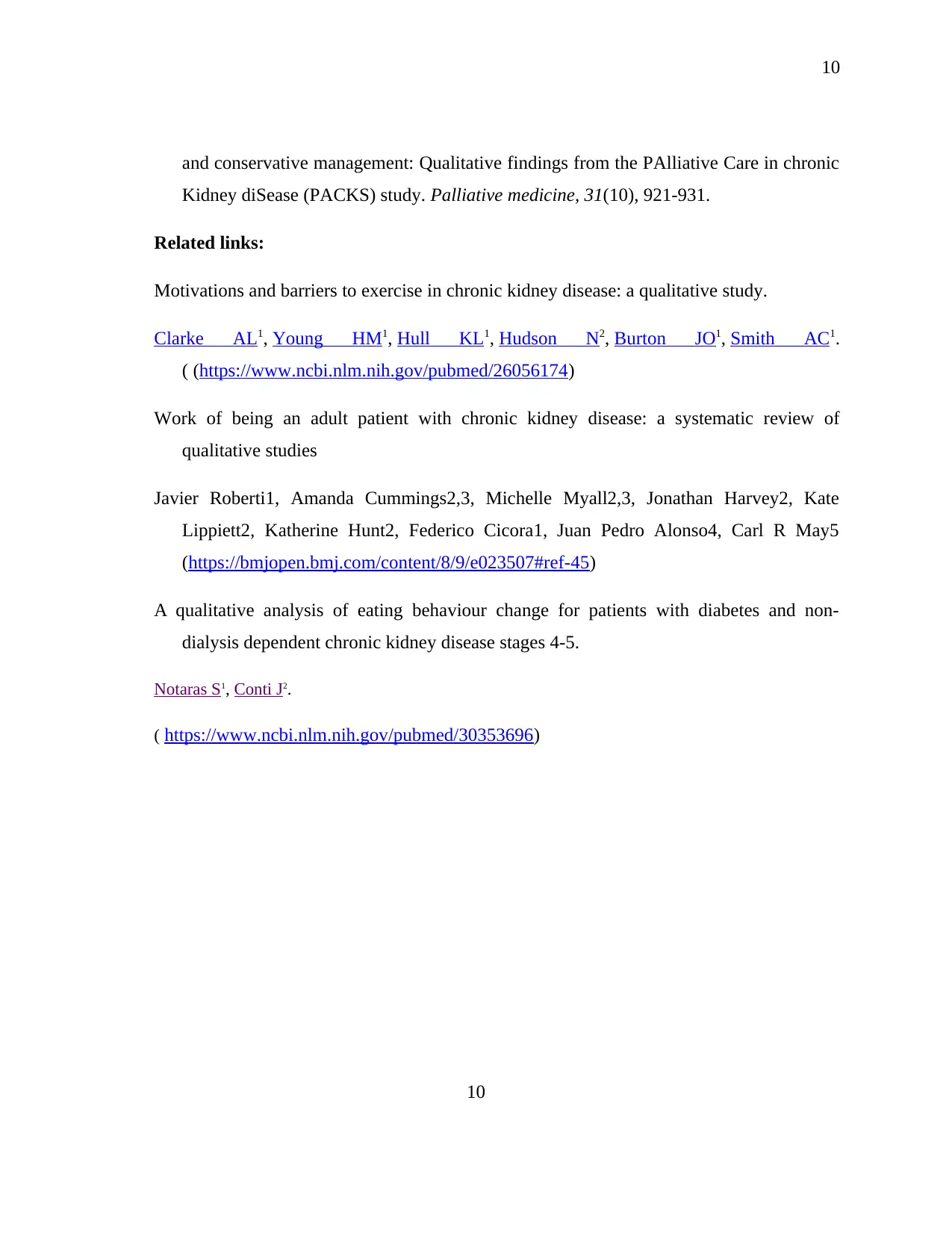
10
and conservative management: Qualitative findings from the PAlliative Care in chronic
Kidney diSease (PACKS) study. Palliative medicine, 31(10), 921-931.
Related links:
Motivations and barriers to exercise in chronic kidney disease: a qualitative study.
Clarke AL1, Young HM1, Hull KL1, Hudson N2, Burton JO1, Smith AC1.
( (https://www.ncbi.nlm.nih.gov/pubmed/26056174)
Work of being an adult patient with chronic kidney disease: a systematic review of
qualitative studies
Javier Roberti1, Amanda Cummings2,3, Michelle Myall2,3, Jonathan Harvey2, Kate
Lippiett2, Katherine Hunt2, Federico Cicora1, Juan Pedro Alonso4, Carl R May5
(https://bmjopen.bmj.com/content/8/9/e023507#ref-45)
A qualitative analysis of eating behaviour change for patients with diabetes and non-
dialysis dependent chronic kidney disease stages 4-5.
Notaras S1, Conti J2.
( https://www.ncbi.nlm.nih.gov/pubmed/30353696)
10
and conservative management: Qualitative findings from the PAlliative Care in chronic
Kidney diSease (PACKS) study. Palliative medicine, 31(10), 921-931.
Related links:
Motivations and barriers to exercise in chronic kidney disease: a qualitative study.
Clarke AL1, Young HM1, Hull KL1, Hudson N2, Burton JO1, Smith AC1.
( (https://www.ncbi.nlm.nih.gov/pubmed/26056174)
Work of being an adult patient with chronic kidney disease: a systematic review of
qualitative studies
Javier Roberti1, Amanda Cummings2,3, Michelle Myall2,3, Jonathan Harvey2, Kate
Lippiett2, Katherine Hunt2, Federico Cicora1, Juan Pedro Alonso4, Carl R May5
(https://bmjopen.bmj.com/content/8/9/e023507#ref-45)
A qualitative analysis of eating behaviour change for patients with diabetes and non-
dialysis dependent chronic kidney disease stages 4-5.
Notaras S1, Conti J2.
( https://www.ncbi.nlm.nih.gov/pubmed/30353696)
10
1 out of 11
Related Documents
Your All-in-One AI-Powered Toolkit for Academic Success.
+13062052269
info@desklib.com
Available 24*7 on WhatsApp / Email
![[object Object]](/_next/static/media/star-bottom.7253800d.svg)
Unlock your academic potential
Copyright © 2020–2026 A2Z Services. All Rights Reserved. Developed and managed by ZUCOL.




